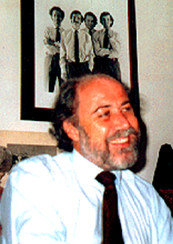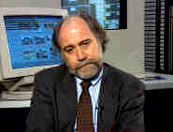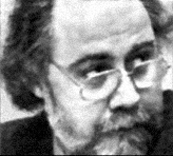 |
|
  
Bibliografia 1977 Gli apparati delle comunicazioni di massa Guaraldi, Rimini 1979 Sociologia della vita quotidiana Milano 1981 Tra informazione ed evasione: i programmi televisivi di intrattenimento RAI VPT, Roma 1984 La ripresa diretta. Spettatori e testi nella contemporaneità televisiva VQPT n.52, ERI, Roma 1985 Teorie delle comunicazioni di massa Bompiani, Milano 1992 Gli effetti sociali dei media Bompiani, Milano Materiali e documenti in rete Le discrete influenze (Convegno su Mauro Wolf) Le nuove tecnologie dell'informazione al servizio della politica Università e comunicazione a Lugano |
Mauro Wolf (Italiano) The death of Mauro Wolf, by the middle of July 1996, has been a discreet and gentle one, as his lifestyle was. Mauro Wolf was a university teacher and an essayist – Gli apparati delle comunicazioni di massa (Guaraldi 1977), Sociologia della vita quotidiana (Espresso 1979), Teorie delle comunicazioni di massa (Bompiani 1985), Gli effetti sociali dei media (Bompiani 1990), they all had a circulation of 20-30.000 copies each, surely anomalous circulations as regards essays. Born in Trentino, Wolf was for many years a weekly commuter between Lugano and Bologna. After graduating in Florence and a short-period work as an assistant at the University of Urbino, Wolf arrived in Bologna in 1975, where he taught until his death, first at DAMS (Techniques of Radio and Television Language) and then at Communication Sciences Faculty (Communication Sociology), to the foundation of which he contributed, dealing with its scientific organisation. He worked for RAI : "Servizio Opinioni" and "Verifica Qualitativa Programmi Trasmessi (VQPT)" In the same years he started writing essays on media, and he began to attend frequently international conferences on communication sociology. In 1985 he became a contributor for the magazine Problemi dell’informazione (published by Il Mulino), for which he wrote many essays on media sociology (the last one, “Le discrete influenze”, was published posthumous in the December 1996 issue). In 1994 he founded and directed the Communication Sciences Library of Baskerville Research Center, in Bologna, a series made up of essays on communication, which allowed him to make known in Italy authors close to him, who were never been translated before, such as J. Meyrowitz, P. Flichy, Dayan and Katz, etc. Furthermore, Wolf had a role in the birth and starting-up of IFG (the Institute for training on journalism) in Bologna; in the meanwhile he accepted the scientific direction of the professional refresher courses for journalists in the Italian Switzerland. Those who had the privilege of his friendship, know the passion with which he faced his studies and researches, his work as a teacher and human relationships. He knew how to be a warm and cordial friend, but even an inflexible one. He could tell you where you were wrong, if something was better or worse than another, as a good master, sympathetic and accomplice, without exceeding, without being pedantic. That’s why we received for months a large amount of signs of affection from students and colleagues, at the website that Baskerville Research Center set up after his death. For the scientific community, and for all the students who learnt how to study the media thanks to Wolf’s books, it was clear that they had been deprived of one of the most clear and profound minds among the researchers on communication, of a teacher of international merit, who would never give in to the temptation to become "easier", more "consumable" in order to gain popularity with the audience of the media, whose working he knew very well. In the frequent TV interviews (the last of which to MEDIAMENTE, a RAI broadcast, on the occasion of the conference on the future of communication ( Il futuro della comunicazione ) that Baskerville organized in Rome on January 1996), he was always consistent with his behaviour scheme. Precise and circumstantial in his statements, clear and charged with contents, with a monotonous tone that made him sound boring to those who did not listen to his words but limited themselves to “looking” (all this happened even during his lessons, which lacked the witty atmosphere typical of other teachers in Bologna). Umberto Eco, a friend of his and a colleague at the Communication Sciences Institute in Bologna, where they both taught, recalls: "we met in a corridor for 25 years and we worked together profitably. He was one of the most alert researchers in the field of communications; the amount of his researches is an amount of precious things. If we reread is work today we will understand perfectly what the problems of TV are. He used new techniques, he was not only a theorist, but he set up listening and studying groups. We stood on the same corner" (Mattina Bologna, L’Unità, 16/7/1996). The recalls of all his friends are in the same tone. All of them remind the human side of their relationship with Wolf. Angelo Agostini, director of the School of journalism in Bologna, says: "Mauro was a wonderful person, he had peculiar style, attention and love in cultivating friendships. A discreet man, extremely competent, always behind the scenes and never in the spotlight. He put human relationships over all. He said that he didn’t feel his roots, born in Trentino, become citizen of Florence, then of Bologna and Switzerland. His roots were the human relationships, the friendships" (Mattina Bologna, L’Unità, 16/7/1996). But, what is Mauro Wolf’s scientific contribution? Nora Rizza, thacher in Bologna and a friend of his, introducing his last essay "Le discrete influenze" on Problemi dell’informazione 4/1996, writes: "Since reading the title, that resumes – with incisiveness and a little of understatement – his analytical judgement on the role and quality of the media’s social effects, the reader will recognise all the signs of the style of thought and the ethical tension that mark Wolf’s scientific approach. A media specialist, adverse to the media-centrism and against every schematism regarding ideologies, fashions, slogans and current ideas; he was wise and creative in making the analysis on the role of media interact with diverse perspectives and disciplines; he was extraneous to every kind of intellectual provincialism such as to the easy effects of the eclecticism. Wolf urges us once again to free ourselves from 'idees recues', and to look beyond the surface of phenomena to discover the dense and progressive interweaving of interdependences that feeds the complexity of social scene". The scientific peculiarity of Wolf’s works that will last forever is the unquestionable quality of his research work, his capability to fathom the subjects and make their complex nature come to surface, to look at the processes that hide behind the products, the skill in making different methods and approaches interact in media analysis: from sociology of interaction to semiotic, from political economy to cognitive psychology. But Wolf also wanted to lay down definite limits to the media’s desire to be in the limelight in the analysis of contemporary society. As Nora Rizza says: "In fact, he always underlined that the social scenario doesn’t live only on media, and thinking them in terns of absolute stars may be convenient but inadequate." "Mauro Wolf was one of the most honest and sincere person I ever known. He faced the risk of academic marginalization to carry on his ideas, refusing to humour the powerful which decide the academic destinies, dedicating himself only to the quality of his research. The Baskerville Research Center has surely lost the most important of its contributors." Maurizio Marinelli Baskerville Chairman Bologna, 16th July 1996 |
|
© Baskerville - Bologna, Italia - info@baskerville.it - http://www.baskerville.it |
